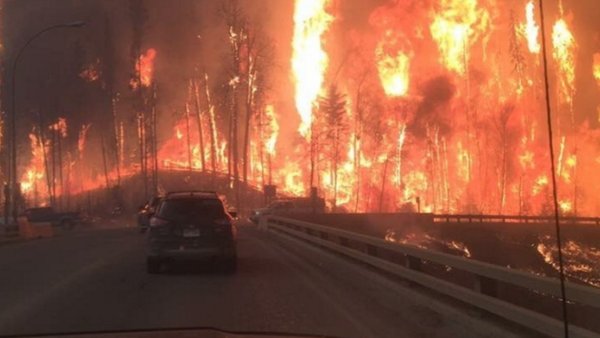Like this article? rabble is reader-supported journalism. Chip in to keep stories like these coming.
Something that I hear more and more these days is that the transition to renewable energy must be managed. It must be careful and planned and not rock the boat.
As the story goes, we cannot disrupt the economy too much in our enthusiasm to go green. Switching from first to fifth gear, they say, would threaten jobs, cause electricity prices to skyrocket, and generate too much upheaval in our still-fossil-fuel-dependent economies.
In and of itself, the cautious acceptance of a green shift is a positive sign. Most people have seen the light and fewer are outright denying climate change or dismissing an eventual shift to a low-carbon economy. We all agree that somewhere down the line, we’ll have weaned ourselves off of fossil fuels.
But the glaring problem with this logic is it presumes that the science behind climate change is negotiable; that if we’re going down the right path, then it doesn’t matter how long it takes us to get there. This kind of thinking supposes that our global climate system is like a sympathetic teacher giving out grades for effort.
I hear some variation of the following all the time: “Yes, we need to move away from oil and gas, but it will take time and we can’t be reckless about it.”
There seems to be more concern about the risks of moving too quickly on climate change than there is about the catastrophic consequences of moving too slowly.
Too much, too soon?
True to capitalist tradition, this logic tries to make the natural environment subordinate to our chosen economic system. It tells us that there are fixed economic rules about too much spending and subsidies, or about interfering too much in the market that we simply cannot break, while presuming that the finite limits of our atmosphere can be bent, stretched or just plain ignored to suit our needs.
It’s as if we’re trying to cut a deal with the planet. “We promise we’re getting our shit together. Just give us a bit more time to work out the details.” We’re a death row inmate trying to negotiate a pardon as we approach the electric chair. The solutions some of our leaders are putting forward to address global warming suggest that we hold all the cards.
We don’t.
The warming trends in the last three years would imply that the planet is not interested in granting us an extension. 2014 was the hottest year on record until 2015 set a new record, which 2016 is set to smash. There has not been this much carbon in the atmosphere in 800,000 years.
A study released in March revealed that you have to go back 66 million years for an injection of greenhouse gases into the atmosphere at a rate comparable to today. This event was followed by 120,000 years of warming.
The boreal forests haven’t been burning this hot in 10,000 years. Australian researchers have confirmed that 93 per cent of coral in the ocean are being devastated by bleaching. We’ve lost half of the world’s animal population in just the last 40 years. Just this week it was announced that five Pacific islands have been lost to rising seas.
A recent article by well-known Canadian journalist Gwynne Dyer busts our assumption that the planet will warm in a controlled, linear fashion. What’s becoming more evident with each new study and extreme weather event is that we could be bumping up against that 1.5C safe limit much sooner than expected.
It is for these and other reasons that I find any argument about developing renewable energy while at the same time maintaining or expanding our fossil fuel production utterly ridiculous. Pipelines cannot pay for climate change action.
The planet does not work for us
This vision is economically elegant, but it is not grounded in the environmental reality that scientists have been clearly and repeatedly telling us, which is that at least 80 per cent of the remaining oil, gas and coal reserves must stay in the ground if we are to have a decent chance at avoiding catastrophic, runaway climate change — the kind of change that would see temperatures rise by at least 5-6 C by the end of the century, with no recourse for slowing down the rapid warming and the devastating impacts that would ensue.
Our best intentions will not change the fact that we can only release approximately 560 gigatonnes of carbon into the atmosphere before the future is truly taken out of our hands. That’s the budget we have to work with.
It’s heartbreaking that we wasted decades doing nothing, due in large part to oil company cover-ups, as underlined by the news this week that Exxon Mobil’s own researchers had “no doubt” about climate change in 1980, before the company began funding decades of subversive climate denial and public deception to avoid regulation. If we had started acting back in 1980, then a managed transition might have been possible. But we’re long passed that point.
Our transition — by necessity — must be rushed, hairy, frantic, destabilizing, disruptive and all over the place.
Will it mean turning off the taps tomorrow? No. But in 10 or 15 years? It might need to mean that. While this outlook might sound economically deranged, why are the policies that would guarantee environmental disaster deemed so much more practical?
We’ve been digging ourselves into such massive environmental debt for generations. We need to stop telling ourselves that it is us who dictates the repayment terms.
Jason LaChappelle is an environmentalist from Edmonton, now living in Whitehorse where he works for a Yukon-based conservation organization. He actively volunteers with Greenpeace and other climate-related initiatives.
Like this article? rabble is reader-supported journalism. Chip in to keep stories like these coming.
Image: YouTube



